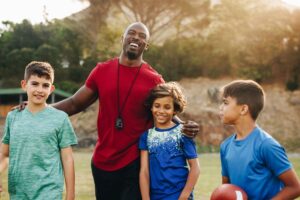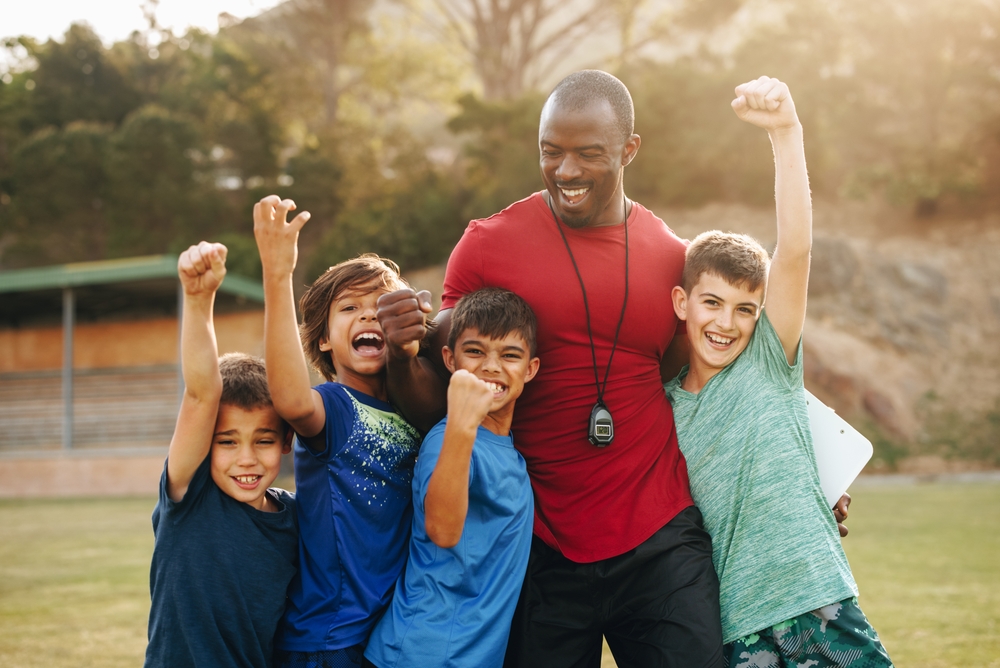Introduction
Physical education is responsible for facilitating human movement, fitness, and health. If someone has an inclination towards sports, fitness, and helping others to develop, then that person can carve out a professional route in physical education. Many students limit their view to “PE teacher in school,” but the field offers much more. In this blog, I will walk you through many viable career paths in physical education, what each role involves, required education, strengths you must build, growth prospects, and tips to start strong.
This article uses simple language. I use direct sentences, no long consecutive complex ones. By the end, you will see many options in PE and can choose what suits you best.

What Is Physical Education & Why It Matters
Physical education (PE) refers to teaching movement, sports, fitness, wellness, and health. It combines theory and practice of how our body works, how to train, how to prevent injury, and how to motivate people to stay active.
PE matters because:
- It also works to prevent lifestyle diseases in the child or adult population (such as obesity or diabetes).
- It fosters discipline, teamwork, confidence, and mental strength.
- They supports sports culture and national athletic success.
- It opens doors for jobs in schools, fitness centers, sports management, health sectors.
As awareness about fitness and health rises, demand for professionals in physical education also grows.
Major Career Roles in Physical Education
Here are key roles you can pick in physical education. Some lean more toward teaching, others toward fitness, research, or admin.
| Role | What You Do | Who You Work With | Core Skills & Traits |
| PE Teacher (School) | Teach students sports, exercises, rules, fitness routines | Schools, district education boards | Communication, planning, enthusiasm, patience |
| Sports Coach / Trainer | Train athletes in specific sport(s) | Clubs, teams, academies | Deep sport knowledge, motivational skills, technique training |
| Fitness Trainer / Instructor | Design exercise plans, guide clients | Gyms, health centers, as freelance | Anatomy, client handling, consistency, empathy |
| Sports Psychologist | Help athletes manage mental pressure | Teams, sports institutes, labs | Psychology background, empathy, observation |
| Sports Nutritionist / Dietician | Plan diet for athletes | Sports teams, training centers, clinics | Nutritional science, food planning, research skills |
| Sports Scientist / Researcher | Study human movement, develop new methods | Universities, research labs | Scientific method, data analysis, specialty knowledge |
| Sports Administrator / Manager | Run sports events, manage facilities, budgeting | Sports bodies, clubs, government | Organization, leadership, networking |
| Athletic Director | Oversee sports programs at institutions | Colleges, universities, schools | Strategy, leadership, coordination |
| Sports Commentator / Journalist | Report on sports, interviews, stories | Media houses, TV, digital media | Communication, writing skill, sports knowledge |
| Referee / Umpire / Match Official | Enforce rules in sports matches | Local, national, international games | Rule knowledge, decision-making, composure |
| Recreation Manager | Manage community recreation programs | Parks, community centers, resorts | Program design, people skills, safety focus |
| Wellness / Corporate Fitness Manager | Plan wellness programs for employees | Corporates, health clubs, wellness centers | Health knowledge, organizational skill, presentation |
These roles each require different preparation and educational paths. Many overlap — for instance, a PE teacher may also coach or manage sports events.
Various sources list overlapping roles. For example, Indeed names roles like fitness instructor, athletic trainer, sports dietitian, etc. Another source lists a PE teacher, personal trainer, sports scientist, leisure manager, etc. The list from the Government of India’s education material includes physical training instructor, fitness consultant, sports psychologist, infrastructure developer, etc.
Deep Dive into Top Careers
Let’s examine major career paths in more detail. For each, I describe job duties, educational requirements, salary trends, challenges, and tips.
1. School/College PE Teacher
Job Duties
- Plan and deliver physical activity lessons and classes
- Teach games, movement skills, health & fitness theory
- Assess student performance, give feedback
- Organize sports day, interschool competitions
- Ensure safety and maintain sports equipment
Education & Certifications
- Undergraduate degree in physical education (B.P.Ed, B.Sc PE) or related fields
- For higher posts or colleges, master’s (M.P.Ed) or equivalent
- Depending on the country or state, the teacher must hold a teaching license or certificate.
- Workshops, certifications for first aid, adapted physical education
Salary & Growth
In India, school PE teachers may start around ₹2,40,000 per year and can rise higher with experience and in reputed schools. In some places abroad, PE teachers earn more depending on seniority and region.
You can grow into head of department, sports coordinator or move to college-level teaching or administration.
Challenges
- Managing students of varying fitness levels
- Limited infrastructure can affect learning.
- Motivation becomes a big challenge.
Tips to Succeed
- Be creative: use varied activities
- Keep yourself updated on the latest sports and fitness trends.
- Consider getting certified (yoga, aerobics, etc.).
- Volunteer coaches also build strong résumés.
2. Sports Coach / Trainer (by Sport)
Job Duties
- Analyze athlete performance
- Plan training drills, strength & conditioning
- Teach techniques, tactics, mental preparation
- Monitor injuries, suggest rest or rehab
- Attend competitions, guide on strategy
Education & Qualifications
- Bachelor’s degree awarded in physical education or sports science or kinesiology.
- Some specific credentials were established to function as coaching licenses for a certain sport.
- Workshops, diplomas in strength & conditioning
- Experience as athlete or assistant coach helps
Salary & Growth
In India, a coach gets paid differently, anywhere from ₹3,60,000 to ₹12,00,000, depending on the level and esteem given to him. The international category of coaches- those working for national teams- earn far greater.
You can advance to high performance coach, head coach, or technical director roles.
Challenges
- High pressure to produce results
- Irregular schedules (early mornings, late evenings)
- Athlete injuries and performance fluctuations
Tips
- Focus on a sport you love
- Build network in sports federations
- Gain experience across levels (grassroots to competitive)
- Stay updated with sports science
3. Fitness Trainer / Gym Instructor
Job Duties
- Write or structure fitness programs (strength training, cardio, flexibility)
- Work in group classes (aerobics, HIIT, Zumba, yoga)
- Observe client form and provide feedback
- Track client progress, change plans accordingly.
- Offer lifestyle changes that could include sleep and nutrition.
Education & Certification
- Physical Education, Exercise Science, or its correlate would have been a certain degree or diploma.
- Certification from various fitness bodies (local, ACE, NSCA, etc.).
- CPR / first aid certification
Salary & Growth
In India, fitness trainers can start at a lower salary but can scale up with reputation. Some sources quote an annual salary ranging from anything around ₹116,000 up to ₹518,000 and above. Trainers with experience and a strong clientele may be making much more.
You can create a specialty and set up your own studio (for instance working rehabilitation, yoga or pilates).
Challenges
- Client retention
- Work hours may be odd
- Need to keep updating methods
Tips
- On social media, you create your brand.
- Give free talks to get clients.
- Get specialization (e.g., senior fitness, functional training).
4. Sports Psychologist / Mental Conditioning Coach
Job Duties
- Help athletes handle pressure, anxiety, focus
- Conduct workshops on mental toughness
- Use psychometric tests, interventions
- Work with coaches to integrate mental training
Education & Requirements
- Psychological degree (B. Sc, MA) and specialization in sports psychology
- Licence/certification (depending on area)
- Internship or experience with athletes
Earnings & Growth
Compensation depends heavily on clientele and reputation. Top athletes, pro teams pay well.
You may serve as consultant to sports bodies, or join academic institutes.
Challenges
- Convincing teams of mental health importance
- Handling athletes in crisis
- Balancing confidentiality and team demands
Tips
- Publish research or articles to build credibility
- Collaborate with coaches
- Keep learning about performance psychology
5. Sports Nutritionist / Dietician
Job Duties
- Assess athlete’s nutritional needs
- Plan diet and meal plans
- Monitor body composition, hydration
- Suggest (legal, safe) supplementation
- Coordinate with coaches and physiotherapists
Education & Licenses
- Degree in nutrition, dietetics, food science
- Postgraduate specialization in sports nutrition
- Registration or license (depending on country)
Salary & Growth
Compensation depends on level (club, elite athlete, national team). With reputation, earnings are high.
You can work freelance, or join sports institutes or clinics.
6. Sports Scientist / Researcher / Biomechanist
Job Duties
- Study human movement, performance
- Use tools like motion analysis, force plates
- Conduct experiments, collect data
- Publish findings, suggest improvements
Education & Path
- Bachelor’s in sports science, exercise science
- Master’s / PhD for advanced roles
- Lab experience, familiarity with instruments
Growth & Earnings
Research institutions, universities, elite sports bodies hire scientists. Pay depends on institution and grant funding.
Challenges
- Funding constraints
- Long hours, meticulous work
- Pressure to publish
7. Sports Administration / Management / Event Organizer
Job Duties
- Plan and organize sports events
- Handle budgets, sponsorship, logistics
- Manage facility, staff, operations
- Coordinate with media, government
Education & Skills
- Degree in sports management, business, or physical education
- Skills in finance, marketing, negotiation
- Experience internships with sports bodies
Earnings & Growth
Managers of large events or organizations command high pay. Smaller events pay modest but can be stepping stones.
Challenges
- Coordinating many stakeholders
- Meeting deadlines under pressure
- Dealing with regulatory, safety issues
Tips
- Get experience with local events
- Network with sports bodies
- Learn legal, marketing aspects
8. Sports Commentator / Journalist / Media Role
What You Do
- Cover live sports matches
- Do commentary, interviews, features
- Write articles, blogs, scripts
Education & Skills
- Degree in journalism, mass communication, English or sports journalism
- Strong knowledge of sports
- Communication skills, storytelling
Pay & Growth
Begin with low pay, but growth depends on reach, audience, reputation.
Challenges
- Irregular hours
- Travel demands
- Constant learning, staying updated
9. Referee, Umpire, Match Official
Role & Duties
- Enforce rules during games
- Make impartial decisions
- Stay fit, alert
Path
- Learn rules in depth
- Join refereeing courses, certification
- Gain experience at local levels, gradually rise
Earnings
Payment per match. Top level matches pay much better.
Challenges
- Pressure from players, crowd
- Travel
- Maintaining fairness
10. Recreation / Leisure Center Manager
What You Do
- Plan and run recreational programs
- Manage staff, budgets, safety
- Engage community
Skills & Education
- Degree in physical education, hospitality, sports management
- Leadership, organizational skills
Growth & Pay
Depends on institution; good opportunity in resorts, clubs, municipalities.
Emerging & Hybrid Roles
These roles blend physical education with tech, wellness, or social impact.
- E-sports fitness coach: training players in physical fitness for gaming
- Online fitness / coaching via apps
- Wearable tech consultant / analyst
- Inclusive PE specialist (for differently abled)
- Health and wellness coach in corporates
- Sports data analyst / performance analyst
- Fitness app content creator / influencer
Trends show modern PE professionals need tech skills, ability to deliver online, and integrate wellness and mental health.
Also, AI and data tools are entering PE classes — PE teachers are exploring how AI can help personalize training.
How to Choose Which Path Suits You
Here are factors you should weigh:
- Your passion / strength — Do you prefer teaching? Coaching? Research?
- Preferred setting — School, gym, clinic, lab, media, corporate
- Level of education you’re willing to pursue — Some roles need master’s or PhD
- Income expectations and stability
- Work hours and lifestyle
- Growth prospects in your region or country
List your priorities (salary, impact, work-life balance). Map them against roles above.
Roadmap: How to Get Started
Here’s a step-by-step plan to build your career in PE:
| Step | What to Do |
| Step 1 | Choose the path(s) you like from above |
| Step 2 | Enroll in a relevant undergraduate degree (PE, sports science, kinesiology) |
| Step 3 | Take certificates/workshops (coaching, fitness, nutrition) |
| Step 4 | Gain experience via internships, volunteering, assistant roles |
| Step 5 | Build your portfolio (projects, client feedback, coaching successes) |
| Step 6 | Network in sports / education communities |
| Step 7 | Stay updated via continuing education, research, certifications |
| Step 8 | Aim for specialization or higher roles (admin, researcher, senior coach) |
Also, soft skills like communication, leadership, empathy and resilience matter heavily.
Challenges & Realities to Face
- Infrastructure gaps in many areas
- Irregular income in initial years
- Need to keep updating your knowledge
- Competition in desirable roles
- Physical demands of being active
But if you remain persistent and passionate, you can overcome challenges.
Future Outlook & Demand
As more people care for fitness and healthy living, demand for PE professionals will rise. Schools, clubs, wellness centers, startups, healthcare sectors will all need experts.
In India, policies like emphasis on sports, introduction of wellness in schools, and increased awareness help. Globally, interdisciplinary roles combining PE, health tech, data, psychology will grow.
Tips to Shine
- Always keep learning (courses, workshops)
- Build a personal brand (blog, social media)
- Publish your work or case studies
- Seek mentors
- Be open to small roles early — they often lead to bigger ones
- Focus on building trust with clients or students
Sample Career Path Stories (Hypothetical)
- Priya, after B.P.Ed, worked as school PE teacher for 3 years. Then she earned a coaching certification in basketball, started coaching a local team, and now is assistant coach for district-level teams.
- Rahul, after a sports science degree, joined a gym as a fitness trainer. He built a niche in senior fitness. He now helps design wellness programs for corporations.
- Sana, studied psychology + sports, now works as a sports psychologist with an athletics academy.
Such paths show how flexible and hybrid careers can become.
Conclusion
Physical education offers a rich field with many directions. You do not have to limit yourself to a single role. You can teach, coach, research, or manage-many times, anything goes. The important thing is to know what suits you, to prepare with the right education and skills, build experience, and adapt.
If you put good work into it and stay passionate about it, a career in physical education can be rewarding, stable, and influential.




